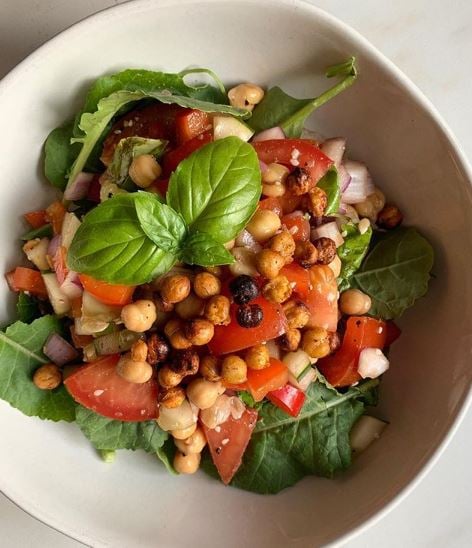
Back
Vegetarian Mediterranean Diet

Whether you learn best with one-on-one support or in a small group setting, we have the perfect program for you.
We also offer a wide array of self-guided materials, empowering you with valuable resources to further support your transformation.
How Nutrition Coaching Works
Our programs are meticulously designed to help you achieve your health goals while enhancing your overall well-being.
We provide personalized counseling and unwavering guidance, ensuring that every step of your journey is met with success.
Take Our QuizOnPoint's team of highly skilled online dietitians and nutritionists are dedicated to empowering you with the knowledge and tools to cultivate sustainable habits that lead to long-lasting success on your health and wellness journey.

The Mediterranean Diet is a common healthy lifestyle buzzword. You may be wondering, what does this cuisine entail, or can I follow a Vegetarian Mediterranean Diet? The answer is Yes! The Mediterranean Diet is based on the cuisine popular in the countries surrounding the Mediterranean Sea. Merging the Mediterranean approach to a vegetarian or vegan lifestyle is very simple.
Here’s why: both the vegan/vegetarian diet and the Mediterranean Diet emphasize fruits, vegetables, whole grains and heart-healthy fats (like olives and avocados). Both are abundant in nuts, beans, and whole grains, which provide you with high fiber and high-quality protein to help you feel satisfied and full of energy.
Start by focusing on your protein sources. Include a variety of nuts, seeds, beans and legumes, and depending on your food restrictions, include eggs and dairy. Chickpeas, lentils and black beans can be a core ingredient for your meals. These staple foods provide you with high quality plant-based protein along with micronutrients and minerals, including fiber, potassium and iron (all of which are important to include in a vegetarian diet).
The Mediterranean Diet includes a wide variety of high-quality starches. Examples include farro, couscous, whole grain oats, buckwheat, brown rice and quinoa. These ancient grains provide you with an abundance of nutrients, including additional protein, vitamins and minerals. Eating five to seven starch servings daily will provide you with the proper nutrition to feel full throughout your day.
Mediterranean diet fat sources include olives, olive oils, avocado and a variety of nuts and seeds. These foods improve flavor and provide various health benefits. Because fats have higher calorie content than fruits and vegetables, be sure to measure portions appropriately. One serving is one teaspoon for oils or butters, and one tablespoon for nuts, seeds and nut butters.
Fruit and vegetable sources are abundant in a Mediterranean climate. Include a wide variety of both fruits and vegetables to prevent repetitive recipes and cuisine boredom. Fruits and vegetables are great to feature as main ingredients or to use as a snack between meals. Enjoy eating both fresh, steamed, roasted or even grilled.
Check out this Mediterranean Quinoa Salad recipe; it includes kalamata olives, cucumber, tomatoes and feta cheese and can be used as a main dish or included as a side.
As always, finding a new diet or eating plan that helps you achieve your goals may take time. Don’t be afraid to ask for help. Dietitians help you see (and feel) the results you are looking for. Your dietitian will help balance your Vegetarian Mediterranean Diet to meet your dietary requirements all while providing a wide variety of flavors and foods to choose from.
With so many rigid diets and information about quick fixes on how to look and feel great, it can be hard to find which program is right for you. At OnPoint Nutrition, our personalized programs offers one-on-one coaching from a qualified team of dietitians and nutritionists to help you reach your health goals.